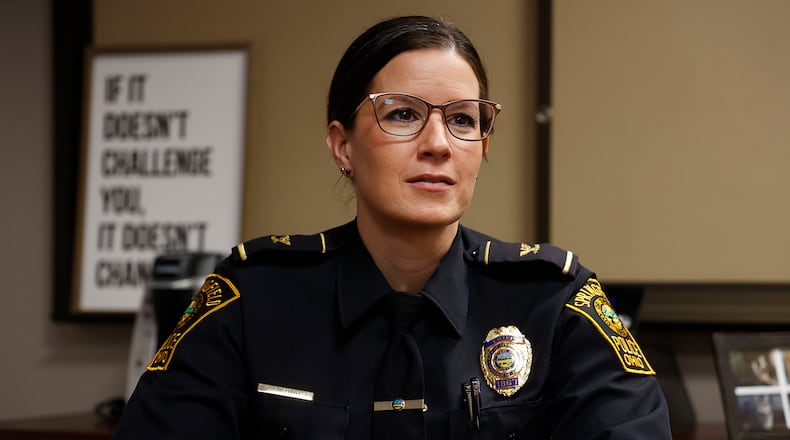“I’ve been grateful for every day as chief,” Elliott said. “The community support has been so humbling.”
Recruiting and retaining a diverse police force is ongoing work at the police division, Elliott said. Police departments across the nation struggle with short-staffing as seasoned officers are reaching retirement age or others are leaving the force for other career options. This national trend is influenced by the changing nature of crime and the public’s perception of policing.
The city of Springfield aims to have 30% of its police force consist of female employees by 2030, and Elliott described that as a “reachable goal.”
The police division has already made modifications to create a welcoming atmosphere to women, including work done on Springfield’s police station layout.
“We want to create a welcoming space,” she said. “This means we’re assessing and looking at our practices.”
But many other qualities factor into a diverse, qualified police force, Elliott said.
“Diversity looks different in many ways,” Elliott said. “Sometimes it’s in background. Other times it’s in thought.”
Elliott also hopes to continue work toward recruiting from Springfield’s pool of young people, encouraging them to take root in the community they grew up in.
Connecting with young adults starts in schools and collegiate programs, Elliott said. School resource officers in Clark County’s school districts interact with students every day, and Springfield’s chief said the police division is looking into bringing its cadet program back online.
The police division is also working with colleges in the region to talk to college athletes about recruitment opportunities, Elliott said.
Female students are actively pursuing law enforcement courses at a rate higher than past decades, according to Karen Benton, the criminal justice program coordinator at Clark State College.
Classes were once primarily filled by young men, but Benton teaches a course currently that is completely attended by women.
And young women studying law enforcement in Clark County see a rarity. The leader of policing in the county’s seat, the sheriff’s office and the local post of the Ohio State Highway Patrol are all women. Clark County Sheriff Deb Burchett was elected in 2016, and the Springfield post commander Lt. Christina Hayes was appointed to her role in 2021.
“It’s been pretty neat to see that,” Elliott said. “Women bring unique strengths to the job.”
The three agencies often work together and have “positive partnerships,” Elliott said. Communication is made even more possible given the opening of the countywide dispatch center.
Elliott first sought employment with Springfield’s police division after completing an internship there that “ignited purpose” within her. She was promoted to the role of captain at the Springfield Police Division last summer, where she previously oversaw the Uniform Patrol Division. Elliott also served as a crisis negotiation team commander and as a lieutenant overseeing the professional standards unit in her tenure there.
There was little time to settle into her current role, however, with the police division responding to shootings that resulted in the deaths of two people and injuries among others within her first month as chief.
Trauma reverberates in instances of community violence, and Elliott said she’s passionate about mental health awareness.
The police division works with local mental health agencies to connect officers to resources, both in Clark County and through the state.
Training of officers is also tailored to mental health concerns across the community, with police completing training courses on topics like de-escalation.
Elliott believes the city’s police force can also play a role in helping build up Springfield’s youth.
The era of physical distancing and COVID-19 restrictions impacted officers’ abilities to connect with the community in face-to-face interactions and events, but outreach like the National Night Out event and Badges for Baseball are beginning to roll out again.
“These young children are our future,” Elliott said. “And I’m confident that our community is coming together.”
The police division works with numerous partner agencies for outreach, including faith-based organizations, community advisory groups, the court system, area businesses and more.
Springfield NAACP president Denise Williams voiced happiness over Elliott’s role as chief and said she looks forward to working with her once she settles into her job.
“I’m really, really excited about working with her,” Williams said.
Many people, inside and outside of the police force, supported Elliott throughout her career. The city’s police chief credits her family as being her major support group. Growing up, she said she was surrounded by a network of strong women, including her grandmother and her mother. Elliott also finds herself by her younger sister, Stephanie, who works as a nurse.
“I grew up with people who loved me telling me ‘Whatever you put your mind to, you can do it,’” she said.
Benton said Elliott’s appointment to the role as chief is inspiring to many young people trying to find themselves in a male-dominated field.
“Watching Chief Elliott get that position is really a sign of the times in terms of maybe it’s not so much it even being a gender issue, but maybe it’s more about the type of leadership you can provide,” Benton said. “From working with her over the years… she cares about the community.”
About the Author

